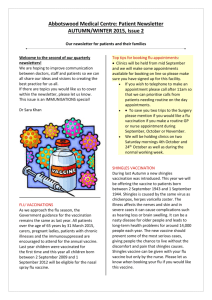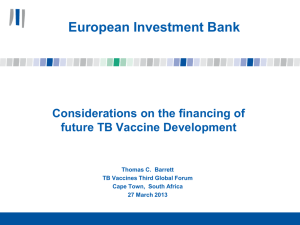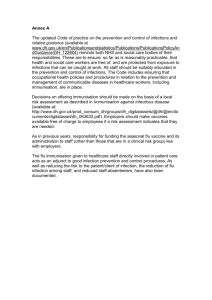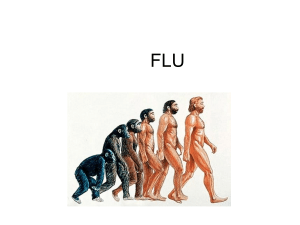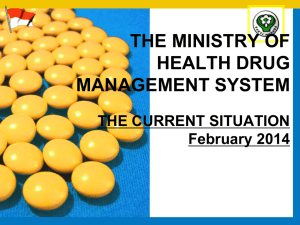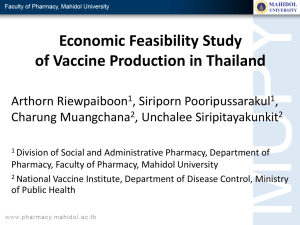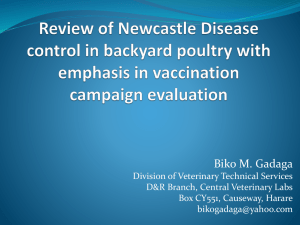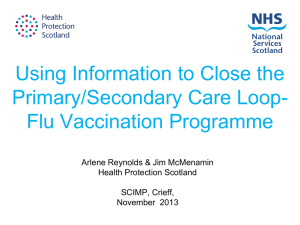The national flu programme, Public Health England
advertisement
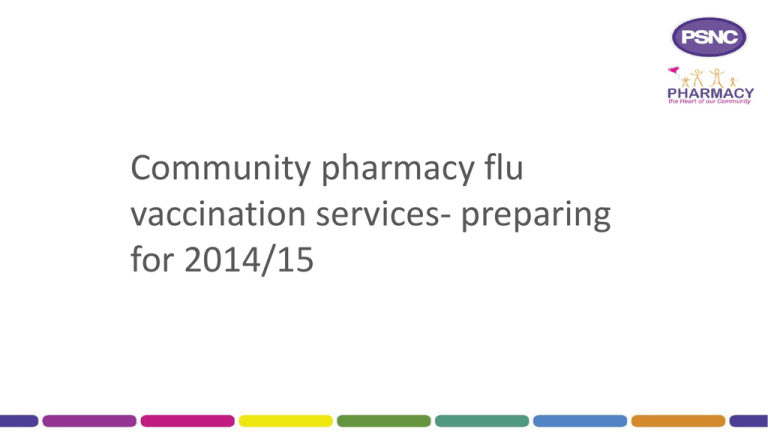
Community pharmacy flu vaccination services- preparing for 2014/15 The national flu programme Jo Yarwood Programme Manager - Immunisation Public Health England Vaccine uptake since 2000 65 and over (under 65 ‘at risk’) 3 Year England (%) Scotland (%) Wales (%) 2000–01 65.4 65 39 Northern Ireland (%) 68 2001–02 67.5 65 59 72 2002–03 68.6 69 54 72.1 (55.8) 2003–04 71.0 72.5 63 73.4 (63.8) 2004–05 71.5 (39.9) 71.7 (39.3) 63 72.7 (65.2) 2005–06 75.3 (48.0) 77.8 (46.3) 68 76.8 (80.9) 2006–07 73.9 (42.1) 75.2 (37.8) * 75.1 (71.2) 2007–08 73.5 (45.3) 74.3 (44.4) 64 75.7 (68.3) 2008–09 74.1 (47.1) 76.3 (47.8) 60 (41) 76.8 (74.0) 2009–10 72.4 (51.6) 75.0 (53.4) 64 (49) 77.0 (80.0) 2010–11 72.8 (50.4) 75.3 (56.1) 65.8 (48.6) 74.9 (78.7) 2011-12 74.0 (51.6) 76.6 (59.7)** 67.7 (50.0) 77.0 (81.7) 2012-13 73.4 (51.3) 76.5 (55.9) 67.7 (49.7) 75.0 (80.2) Flu uptake 4 Year 2012/13 2013/14 65 and over 73.4% 73.2% Under 65 at risk 51.3% 52.3% Pregnant women 40.3% 39.8% All 2 year olds n/a 42.6% All 3 year olds n/a 39.6% HCW 45.9% 54.8% Getting vaccinated in pharmacies • 89K people got the jab at Boots • just over 20% of these were in a risk group • they could therefore have got a free NHS jab. • processes should be in place for GP records to be updated • do these immunisations go unrecorded on GP systems? 5 • it may be that the official vaccine uptake figures produced, particularly for the under 65 at risks who are more likely to be in employment and less likely to see their GP, underestimate the true vaccine uptake figures. • http://www.pjonline.com/news/research_highlights_opportunity_for_pharmacy_to_fill_gap_in_flu_vaccinations? The risk of the risk groups Number of fatal flu cases (%) Mortality rate per 100,000 population Age-adjusted relative risk* 4.0 0.4 11.3 (9.1-14.0) Baseline 4.8 18.5 Chronic heart disease 213 (59.8) 143 (40.2) 19 (5.3) 32 (9.0) 3.7 Chronic respiratory disease 59 (16.6) 2.4 10.7 (7.3-15.7) 7.4 (5.5-10.0) Chronic liver disease 32 (9.0) 26 (7.3) 71 (19.9) 42 (11.8) 15.8 378 0.8 In a risk group Not in any risk group Chronic renal disease Diabetes Immunosuppression Chronic neurological disease (excluding stroke/transient ischaemic attack) Total (including 22 cases with no information on clinical risk factors) 6 2.2 20.0 14.7 48.2 (32.8-70.6) 5.8 (3.8-8.9) 47.3 (35.5-63.1) 40.4 (28.7-56.8) Health care workers 7 8 Vaccine uptake in all pregnant women 9 Year England (%) 2010-11 2011-12 2012-13 38.0 27.4 40.3 Scotland (%) 65.6* 41.1 54.0 Wales (%) 39.6 31.7 61.6 Northern Ireland (%) N/A 58.4 64.6 10 So, what’s new? 11 Flu programme extension Aim to offer annual vaccination for all children age 2-16 2013/14 Routine 2 and 3 yr olds Pilot yrs 0 - 6 Potential plan for next three years – 2014/15 Routine 2,3 and 4 yr olds Pilot yrs 0 – 6 & 7&8 2015/16 Extend where indicated 2016/17 Extend where indicated and then ?JCVI assessment 12 Pilot sites and uptake Site Cohort Vaccinated % Uptake Bury 16773 10528 62.8 Cumbria 36289 13528 37.3 Gateshead 14895 7784 52.3 Havering 20545 13408 65.3 Leicester 54966 28600 52.0 Newham 30730 14207 46.2 SE Essex 24723 17509 70.8 Total 198921 105564 53.1 What went well? • Well accepted by children • Well accepted by parents • Schools collaborated well • Nurses enjoyed working with the children • Pharmacists as joint providers • Self administration 14 What was hard? • Administrative burden (consent, screening for high risk etc.) • Generally hard work • Workforce capacity • Working across boundaries • Porcine gelatine 15 What vaccine should be used? Vaccine type Live attenuated intranasal vaccine Fluenz® Authorised age indication Children aged two to under 18 years (see precautions and contraindications) Dose Singleapplicationineach nostril of 0.1ml Children NOT in clinical risk groups only require one dose of this vaccine. Children in clinical risk groups aged two to under nine years who have not received influenza vaccine before should receive a second dose of vaccine at least four weeks later. 16 Inactivated intramuscular vaccine (number of different brands) Children aged six months and older and adults, although some of the vaccines are not authorised for young children – see table 19.6 Inactivated intradermal vaccine - Intanza® 9µg Inactivated intradermal vaccine - Intanza® 15µg Adults aged 18 years to 59 years Adults aged 60 years and older Single injection of 0.5ml (see note above) Children aged six months to under nine years who have not received influenza vaccine before should receive a second dose of vaccine at least four weeks later. Single injection of 0.1ml Single injection of 0.1ml Acknowledge - EVERYBODY 17

